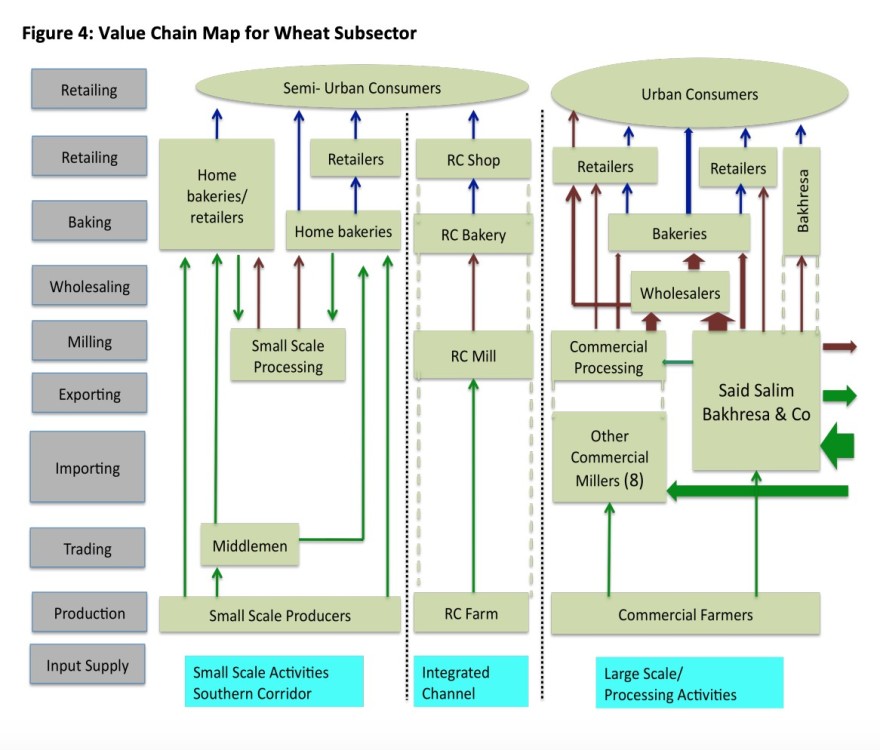The wheat market, usually as steady as a ship on calm seas, is experiencing turbulence. Prices have surged suddenly, with the settlement in September gaining more than 10% on the Chicago Mercantile Exchange (CME) over the last five days, according to trading data. This escalation hasn’t arisen in a vacuum; it’s the consequence of Moscow’s stern warning to vessels heading towards Ukrainian ports, a decision steeped in the deepening discord of the region.
The Russian Defense Ministry’s mention of potential military cargo aboard these vessels significantly aggravates this strained situation. Russia has gone a step further, imposing a blockade on ships bearing food supplies to Ukraine, which has heightened concerns about using food as leverage during the conflict.
But why should this matter to Tanzania, a country that lies a staggering 8,887.5 km or 153 hours away by car? Well, the intricate web of the global economy draws us all into its sphere, whether we are aware of it or not. The debris of this conflict is hitting Tanzania’s Wheat Sector.
I didn’t need to go deep-diving into Google for that driving distance, by the way. It’s my job to sift through the data, so you don’t have to. But why should Tanzania care about these distant tremors in the wheat market? Let’s delve a little deeper into this complex scenario.
Ukraine’s Key Role in the Global Food Tapestry
In the intricate web of global food security, Ukraine, known as the “Breadbasket of Europe,” weaves an essential thread. This nation is a formidable player in grain production, contributing 10% to the world wheat market, 15% to the corn market, and 13% to the barley market.
Furthermore, it takes center stage in the sunflower oil market. Imagine this: a disturbance in Ukraine’s grain exports could shake the global food security landscape, akin to an earthquake in the foundation of a skyscraper.
Positioned as the seventh-largest wheat producer and the sixth-largest corn producer worldwide in 2021/22, Ukraine has etched its role into the annals of significant grain producers. On the barley front, Ukraine competes with heavyweights like the European Union, Australia, and Russia for the top spot.
Now, let’s zoom out to see the buyers in this grain trade. In 2020, Egypt, China, Turkey, Nigeria, and Indonesia emerged as the largest wheat importers.
For Ukraine’s corn, significant customers included the Netherlands, Spain, and China. China, showing an insatiable appetite, also emerged as the largest buyer of Ukrainian barley.
This dynamic food tapestry faces a potential upheaval with the ongoing conflict in Ukraine. Russia’s blockade of Ukrainian ports has led to a suspension of grain deliveries, fueling fears of global shortages and price hikes. This situation casts a long shadow over regions like Africa, the Middle East, and Asia, where the food scenario is already bleak due to the lingering effects of the COVID-19 pandemic.
The pivotal Grain Export Agreement between Ukraine and Russia formerly acted as a lifeline, facilitating the export of 20-25 million tons of grain stuck in Ukraine, along with Russian grain and fertiliser exports. This pact also carved out safe corridors in the Black Sea, allowing ships to pass without fear of attack.
The suspension of this agreement by Russia has thrown a wrench into the machinery of the global grain market. Understanding the full impact of these events requires more than just a cursory glance. It calls for an in-depth look at the interwoven strands of global food security, the players involved, and the challenges they face. In summary;
- Ukraine’s Role in Global Food Security: Ukraine is a major grain producer, accounting for 10% of the world wheat market, 15% of the corn market, and 13% of the barley market. It is also the leading player in the sunflower oil market. A significant disruption in Ukraine’s grain exports could seriously affect global food security.
- Impact on the Global Grain Market: The conflict in Ukraine has led to a suspension of grain deliveries due to Russia’s blockade of Ukrainian ports, causing fears of worldwide shortages and price hikes. This has particularly affected Africa, the Middle East, and Asia, where the COVID-19 pandemic has worsened the food situation.
- Grain Export Agreement: The agreement between Ukraine and Russia facilitated the export of 20-25 million tons of grain currently blocked in Ukraine and Russian grain and fertilizer exports. It also provided secure corridors in the Black Sea for ships to pass without being attacked. Russia’s suspension of this agreement could potentially impact the global grain market and Tanzania’s Wheat Sector.
Navigating the Tanzania’s Wheat Sector
While wheat only contributes to a meager 4% of per capita calorie consumption in Tanzania, it punches above its weight in economic relevance. Two reasons underpin this.
First, as a significant portion of wheat consumed in Tanzania is imported, any price turbulence in exporting nations can send ripples through the country’s foreign exchange reserves. Secondly, with most wheat demand being funneled into rapidly growing urban areas, an expanding population is likely to nudge wheat demand upward.
- On March 28, 2022, The Citizen broke the news of Tanzania keeping a vigilant eye on the brewing storm in Eastern Europe, especially the Russia-Ukraine tensions, as a protective measure for its economy. The ramifications of the war have the potential to infiltrate Tanzania’s economy, nudging up the prices of imported commodities, including newsprint, wheat, and an assortment of other products. In response, the government has entered the negotiation arena with wheat importers to soften the impact and is also exploring alternative import and export hubs.
- In a report by The Citizen on April 28, 2021, the Tanzanian government refuted claims of an impending dip in the country’s wheat production. Agriculture minister Adolf Mkenda waved off predictions of a 22% plunge in wheat production, arguing that responsive governmental measures and agreements with wheat importers would pave the way for a production hike. The government’s chessboard includes moves to stimulate local farmers to increase wheat production, curtailing the country’s reliance on imports.
Fast-forwarding to July 10, 2022, The Citizen reported that Tanzania is charting a course to boost wheat production to a million tonnes by 2025, aiming to reduce dependence on imports and improve Tanzania’s Wheat Sector. To hit this ambitious target, the government is pulling multiple levers: encouraging improved seeds sanctioned by the Tanzania Agriculture Research Institute (Tari), earmarking more land for wheat cultivation, and injecting funds into research and development.
Efforts are also underway to minimize post-harvest losses and bolster trading systems, propelling wheat production forward. Given the current wheat production volume in Tanzania falls significantly short of demand, substantial imports from Russia and Ukraine were the norm. However, the ongoing tussle between the two countries has disrupted this supply chain, pushing wheat prices skyward.

Intel Analysis: Why Tanzania Should be Alert to the Ongoing Conflict
The ongoing conflict between Russia and Ukraine warrants Tanzania’s utmost attention due to several crucial factors tied to its agricultural, economic, and trade domains.
- Wheat Dependency: As one of the significant wheat importers, Tanzania’s reliance on this crop for both consumption and food security is evident. With Ukraine being a substantial contributor to the global wheat market and Russia playing a crucial part in grain transportation, disruptions in this trade route could have severe implications for Tanzania’s wheat supplies, potentially driving up domestic prices.
- Economic Repercussions: The conflict has induced a ripple effect on global wheat prices, escalating them by a staggering 10% in five days. Given Tanzania’s dependency on wheat imports, any cost surgeon worldwide could directly impact its economy, straining foreign exchange reserves and possibly leading to inflation.
- Trade Impacts: With Russia’s suspension of the Black Sea grain deal and blockading of Ukrainian ports, there’s potential for a domino effect on international grain trade. As Tanzania heavily relies on imports to fulfill its wheat demand, any significant disruption in global supply chains could make it challenging to maintain domestic supply levels, potentially leading to shortages and food insecurity.
- Growing Urban Demand: Urban centers in Tanzania have a high demand for wheat products. Any disruptions to supply could lead to price spikes, exacerbating economic inequality and possibly leading to social unrest in these urban areas.
- Strategic Shift: Given the current global scenario, Tanzania may need to consider diversifying its sources of wheat imports. This would likely involve significant adjustments and investments in trade relationships, potentially adding costs and complexity to their supply chains.
- Policy and Tariff Shifts: As a member of the East African Community, Tanzania has specific tariff commitments. Any significant disruption to wheat supplies might require renegotiating these tariffs or other trade arrangements, adding another layer of uncertainty to Tanzania’s economic and trade environment.
In summary, the tumultuous conflict between Russia and Ukraine is a bellwether for Tanzania. The situation demands cautious monitoring and proactive contingency planning to mitigate potential repercussions on its food security, especially Tanzania’s Wheat Sector, economic stability, and social cohesion.
The interconnectedness of global trade underscores that even a conflict happening thousands of kilometers away can have direct and tangible impacts on Tanzania’s shores. Thus, the gravity of this issue should not be underestimated.
Way Forward for Tanzania’s Wheat Sector
Navigating the treacherous waters of global economic shifts and the impact of the Ukrainian conflict on wheat prices, Tanzania finds itself on the cusp of a challenging yet transformative period. The stark reality of their dependence on global wheat supply chains, particularly on the beleaguered duo of Russia and Ukraine, underscores the urgency to fortify the country’s agricultural sector.
The need of the hour is a pragmatic and far-reaching approach that considers the immediate threat of inflated prices and dwindling supplies and the longer-term objective of achieving self-sufficiency in wheat production. This would serve the dual purpose of shoring up the country’s food security and buffering its economy against the vagaries of international commodity markets.
Cue the giants of the agribusiness world – the ‘ABCD’ companies: Archer Daniels Midland (ADM), Bunge, Cargill, and Louis Dreyfus. Courting these conglomerates could lead to a synergy of expertise and resources that could significantly boost Tanzania’s wheat sector. With their vast experience, these companies could bring the much-needed technological know-how, infrastructure, and market linkages. This could be a win-win situation; while Tanzania benefits from a rejuvenated and modernized wheat sector, the ‘ABCD’ companies gain access to an emerging and potentially lucrative market.
But this is only one piece of the puzzle. Tanzania must also take steps to enhance its agricultural sector. This could include developing a comprehensive irrigation infrastructure, encouraging private sector involvement, strengthening agricultural extension services, and improving research and development.
Furthermore, the country could consider diversifying its agricultural portfolio by promoting crop diversification to mitigate risks associated with over-reliance on a single crop.
The government could also consider forging new trade alliances, both regional and international, to diversify its food sources and reduce reliance on volatile global markets.
In essence, Tanzania’s response to this global crisis could catalyze a broader transformation of its agricultural sector. Such a transformation, though challenging, could fortify the country’s food security, stimulate its economy, and insulate it from future shocks in the international commodity markets.
As the country charts its course through this intricate maze, the watchword should be resilience — the resilience of its food systems, economy, and people.
The wheat fields of Tanzania could yet become a beacon of hope, shining with the promise of a more secure, prosperous future. The journey will be long and arduous, but with the right mix of partnerships, investment, and strategic planning, it is a journey that Tanzania can undoubtedly undertake with optimism and confidence.
Read – Russia-Ukraine Conflict: How Russia is Creating a Global Food Crisis

